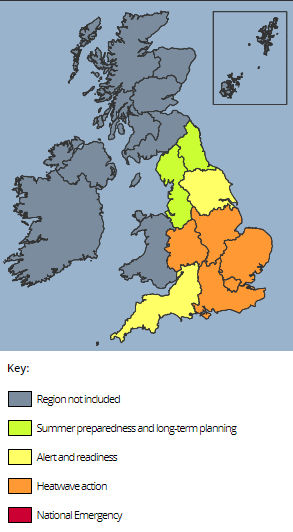The Met Office have issued a Level 3 Heatwave warning for the east of England, including the Isle of Wight.
It reads:
There is a 90 % probability of heatwave conditions between 0900 on Monday and 0900 on Friday in parts of England.
On Monday, hot and humid air will lie over the east and southeast of England, with cloud and outbreaks of rain across northern England. The cloud and rain will gradually break up and turn showery in the north, with some of these heavy and thundery. South of the rain, long spells of sunshine, will develop with temperatures generally ranging from very warm in West and East Midlands, to hot and humid, locally very hot in east and southeastern areas.
Away from northern England, dry and sunny weather should dominate through the week, but interspersed with heavy showers in afternoon and evening periods. Temperatures will be very warm or hot, locally very hot in the east.
Thresholds could be breached in places from Monday onwards, with very warm and muggy overnight conditions. Yorkshire and Humber and southwest England will also see temperatures rise through the week, but with cloud and outbreaks of rain affecting the north and west, there is a lower risk of thresholds being reached.
There is a chance that Alerts will need to be downgraded and/or extended for the end of the week, however confidence is currently low and this will be reviewed through the week.

Met Office advice
The advice from the Met Office reads:
Stay out of the sun. Keep your home as cool as possible – shading windows and shutting them during the day may help.
Open them when it is cooler at night. Keep drinking fluids. If there’s anybody you know, for example an older person living on their own, who might be at special risk, make sure they know what to do.
Advice on how to reduce the risk either for yourself or somebody you know can be obtained from NHS Choices, NHS 111 or from your local chemist.
NHS advice
Dr Barbara Stuttle CBE, Director of Nursing, Midwifery, Allied Health Professionals & Community Services at Isle of Wight NHS Trust says:
“Hot weather can be dangerous for those with pre-existing conditions, especially serious chronic conditions. Ensure that you drink lots of water and stay out of the sun, preferably somewhere cool, if you can. If you have to go out in the sun make sure you cover-up – hats, loose fitting clothes and sun tan cream. We would urge everyone to ensure that they follow our top tips for staying cool and safe during this heatwave.”
Top tips for keeping cool and safe are:
- Shut windows and pull down the shades when it is hotter outside. You can open the windows for ventilation when it is cooler.
- Avoid the heat: stay out of the sun and don’t go out between 11am and 3pm (the hottest part of the day) if you’re vulnerable to the effects of heat.
- Keep rooms cool by using shades or reflective material outside the windows. If this isn’t possible, use light-coloured curtains and keep them closed (metallic blinds and dark curtains can make the room hotter).
- Have cool baths or showers, and splash yourself with cool water.
- Drink cold drinks regularly, such as water and diluted fruit juice. Avoid excess alcohol, caffeine (tea, coffee and cola) or drinks high in sugar.
- Listen to alerts on the radio, TV and social media about keeping cool.
- Plan ahead to make sure you have enough supplies, such as food, water and any medications you need.
- Identify the coolest room in the house so you know where to go to keep cool.
- Wear loose, cool clothing, and a hat and sunglasses if you go outdoors.
- Check up on friends, relatives and neighbours who may be less able to look after themselves.
The main risks posed by a heatwave are:
- dehydration (not having enough water)
- overheating, which can make symptoms worse for people who already have problems with their heart or breathing
- heat exhaustion and heatstroke
A heatwave can affect anyone, but the most vulnerable people are:
- older people, especially those over 75
- babies and young children
- people with a serious chronic condition, especially heart or breathing problems
- people with mobility problems – for example, people with Parkinson’s disease or who have had a stroke
- people with serious mental health problems
- people on certain medications, including those that affect sweating and temperature control
- people who misuse alcohol or drugs
- people who are physically active – for example, labourers or those doing sports
If you’ve read to the end of the article, here’s a little treat for you:
Image: infomatique under CC BY 2.0





